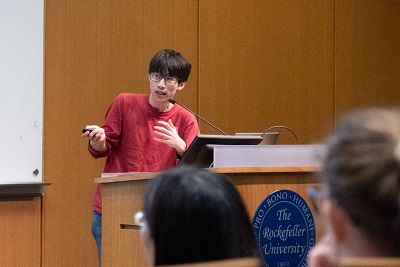Insulin Plays Role in Controlling Fat Craving
Insulin, the hormone needed by the body to process sugar, appears to influence a brain chemical that mediates cravings for fatty foods, according to ongoing studies by Sarah F. Leibowitz, Ph. D., a neurobiologist at The Rockefeller University.
Leibowitz plans to present her recent investigations Saturday, Aug. 13, at the annual meeting of the American Psychological Association in New York, N.Y.
Insulin, made by the pancreas, helps the body’s tissue absorb and use glucose, a sugar, and fats. In diabetes, the pancreas can not make sufficient insulin. In obesity, some tissues are insensitive to insulin.
Insulin is needed to turn off appetite for fats and carbohydrates. Leibowitz and her colleagues found evidence in rats that insulin plays a role in food cravings by influencing the production of the brain chemical, galanin. This protein influences eating, increasing preferences for fats and carbohydrates.
Specifically, changes in insulin levels appear to affect the activity of the gene that makes galanin. When insulin is absent, the gene activity increases, according to Leibowitz’s studies in diabetic rats. More galanin is then made in the brain, causing appetite to grow and energy use to decline.
However, when the animals receive daily insulin injections, the activity of the galanin gene and levels of galanin drop to normal. Diabetic rats have galanin levels that are 50 percent greater than normal rats and they overeat a fat-rich diet.
The gene that makes galanin is active in the middle of the brain’s hypothalamus, a section called the paraventricular nucleus (PVN). The PVN helps control the relationship between the amount and kind of food eaten and how the body processes such nutrients.
In the course of a single day, and particularly after lunch, the researchers found that levels of and sensitivity to insulin drop and galanin proportionally rises. Because galanin also helps reduce energy use, increased amounts of this protein may contribute to the body’s creation and storage of fat, known to rise throughout the day.
“A careful balance exists between hormones, such as insulin, in the blood, and the activity of chemicals in the brain,” Leibowitz says. “When environmental or biological challenges disturb levels of insulin in the blood, the chemistry of the brain is imbalanced. In our research, we want to learn more about how to control the action of the gene that produces galanin and the related behaviors and body chemistry.”
High-fat diets are part of the problem. “When fat is more than 30 percent of a diet, the body becomes less sensitive to insulin,” Leibowitz explains. Based on animal studies, Leibowitz has shown that insulin levels decline more after a high-fat meal, up to 70 percent less of levels found following a high-carbohydrate meal.
The researchers also are examining agents that might control galanin in the brain. This new approach uses synthetic compounds to block the gene’s activity and prevent galanin production. When the agent, short sequences of DNA known as antisense oligonucleotides, is placed directly in the PVN of normal rats, the scientists found that the animals ate less fat, lost weight and increased their insulin production.
The National Institue of Mental Health, part of the National Institutes of Health, supports Leibowitz’s research.


